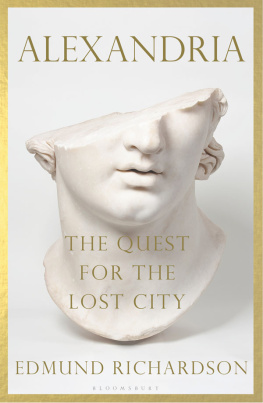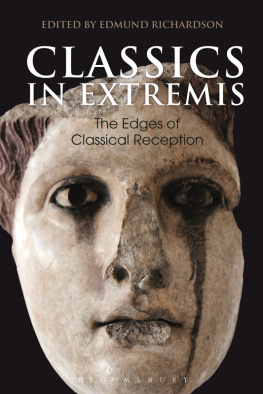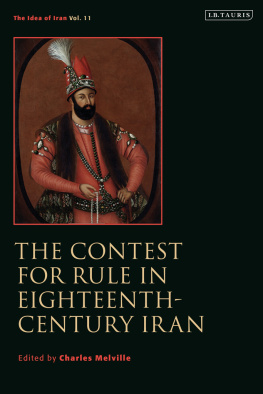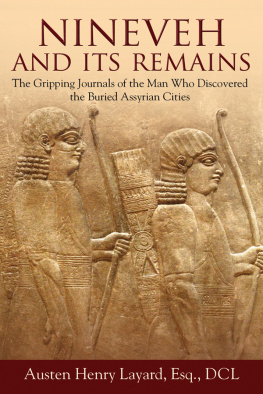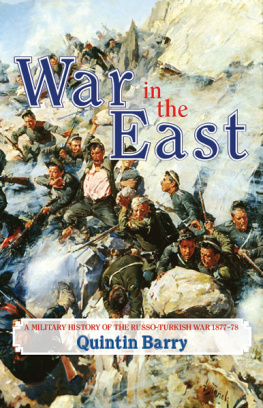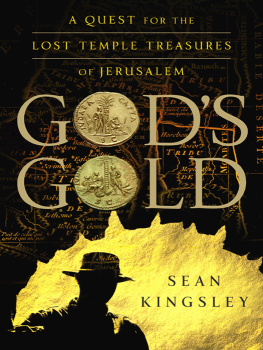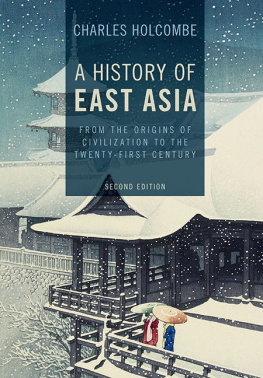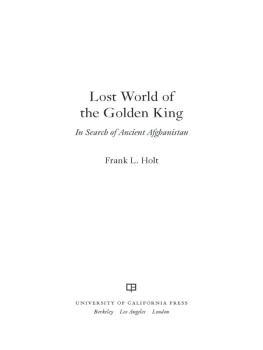
ALEXANDRIA

BLOOMSBURY PUBLISHING
Bloomsbury Publishing Plc
50 Bedford Square, London, WC1B 3DP, UK
29 Earlsfort Terrace, Dublin 2, Ireland
BLOOMSBURY, BLOOMSBURY PUBLISHING and the Diana logo are trademarks of Bloomsbury Publishing Plc
First published in Great Britain 2021
This electronic edition first published in 2021
Copyright Edmund Richardson, 2021
Map Emily Faccini, 2021
Edmund Richardson has asserted his right under the Copyright, Designs and Patents Act, 1988, to be identified as Author of this work
For legal purposes the constitute an extension of this copyright page
All rights reserved. No part of this publication may be reproduced or transmitted in any form or by any means, electronic or mechanical, including photocopying, recording, or any information storage or retrieval system, without prior permission in writing from the publishers
Bloomsbury Publishing Plc does not have any control over, or responsibility for, any third-party websites referred to in this book. All internet addresses given in this book were correct at the time of going to press. The author and publisher regret any inconvenience caused if addresses have changed or sites have ceased to exist, but can accept no responsibility for any such changes
A catalogue record for this book is available from the British Library
ISBN: HB: 978-1-5266-0378-4; TPB: 978-1-5266-0381-4; eBook: 978-1-5266-0379-1
To find out more about our authors and books visit www.bloomsbury.com and sign up for our newsletters
Contents
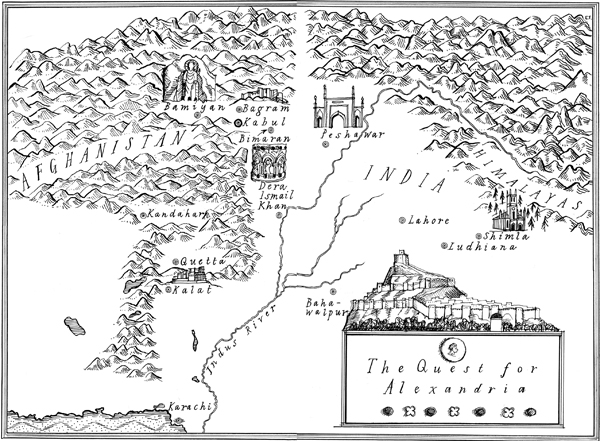
4 July 1827. Dawn smelled of sweat, incense and horseshit.
Private James Lewis, an unremarkable member of the British In India, but not of it, the army camp was a miniature world of snoring soldiers, cooking fires, cannonballs and gunpowder. In the distance, with flocks of tiny birds whirling around its dome, the Taj Mahal loomed up in silhouette. By 6 a.m., the sun was well over the horizon, breaking through the mist on the Yamuna River, and turning the ancient red walls of Agra Fort to flaming gold. At the top of the forts towers, the last of the nights bats flapped home.
For Lewis, it was independence day. He pulled on his uniform, walked out of the gate past the sleepy guards and never went back. By evening, he would be a wanted man
Lewis picked his way through Agra, putting as much distance between himself and his regiment as he could. Squat British bungalows clustered around the whitewashed bulk of St Georges Cathedral, completed the previous year. Closer to the river, the old city slipped back into view. Bright green parrots peered down from the trees. Half-ruined mansions and tombs lined the riverside. Agras star had been fading for almost 200 years: its brief reign as the capital of the Mughal Empire was long past.
The British treated the city as a colossal playground. The imperial apartments of Agra Fort where
As he left Agra behind, Lewis had no way of knowing that he was walking into one of historys most incredible stories. He would beg by the roadside and take tea with kings. He would travel with holy men and become the master of a hundred disguises. He would see things no westerner had ever seen before, and few have glimpsed since. And, little by little, he would transform himself from an ordinary soldier into one of the greatest archaeologists of the age. He would devote his life to a quest for Alexander the Great.
His quest would take him across snow-covered mountains, into hidden chambers filled with jewels, and to a lost city buried beneath the plains of Afghanistan. He would unearth priceless treasures and witness unspeakable atrocities. He would unravel a language which had been forgotten for over a thousand years. He would be blackmailed and hunted by the most powerful empire on earth. He would be imprisoned for treason and offered his own kingdom. He would change the world and the world would destroy him.
This is a story about following your dreams to the ends of the earth and what happens when you get there.
Had he known what was coming, Lewis might have stayed in bed.
James Lewis was born in London, when the nineteenth century was just a few weeks old, on 16 February 1800.
Even as a child, Lewis knew that Britain was not kind to people like him. To survive London you needed money, family connections, or cartoonish reserves of rage and guile. It seems, Egan wrote, some poet has humorously described London as the Devil!
When Lewis was a teenager, the British economy was teetering on the brink of collapse. Londons streets filled up with the newly homeless. East India Company, hoping for a better life.
The East India Company began life as a trading company, running ships back and forth between Britain and the East. But, propelled by fear and greed, it gradually expanded from its coastal trading posts. Local rulers were bullied, blackmailed and deposed, one after another.opium every year. It cared only for profit. It was the god of capitalism.
Many of the Companys officials returned to Britain laden with gold: the spoils of trade, and loot from a hundred Indian treasuries. They have, wrote
It wasnt fair, but the East India Company had never promised fairness. Lewis watched his superiors get rich. In 1825, he spent a hair-raising Christmas at the siege of Bharatpur. The massive fortress, around thirty miles from Agra, had sent a British army packing in 1805, and the East India Company was determined not to risk a second humiliation. When the dust settled over the ruins of Bharatpur, on 16 January 1826, the British divided up the treasure within. The commanding officer,began to mutter under his breath. He dreamed about life on his own terms. In July 1827, after years of thankless service, something snapped.
What happens when you decide to walk away from your entire life? Lewis was about to find out.
The punishing summer heat was beginning to break when he left Agra. The monsoon had swept up from the Bay of Bengal a few days earlier, and the rains, when they came, were cool and blindingly strong. But for the rest of the day, the hills of northern India were brown and bare, and shimmered with heat. Each step raised clouds of dust. Lewis had no money or food. I was now destitute, a stranger in the centre of Asia, unacquainted with the language which would have been most useful to me and from my colour exposed on all occasions to notice. Staying alive was going to be a problem.
Lewis had a bigger problem, though: the East India Company. As soon as his absence was discovered, his description was sent out across India far faster than he himself could travel. Towns, garrisons and frontier officials were put on alert. The Companys vast network of spies took pleasure in hunting deserters down and delivering them over to military justice. If Lewis was caught, he might be flogged to the point of death, revived, then flogged again. Or he might be put to death in a particularly unpleasant manner. The Company was known for tying its Indian soldiers to the mouths of cannon, and quite literally blasting them into smithereens. They would just hang Lewis, but that was cold comfort. Either way, the birds that haunted the Companys places of execution would be waiting.
A number of kites (a bird of prey very common in India) actually accompanied the melancholy party in their progress to the place of execution, wrote one horrified British soldier, as if they knew what was going on, and then kept hovering over the guns from which the culprits were to be blown away, flapping their wings, and shrieking, as if in anticipation of their bloody feast, till the fatal flash, which scattered the fragments of bodies in the air; when, pouncing on their prey, they positively caught in their talons many pieces of the quivering flesh before they could reach the ground.
Next page
